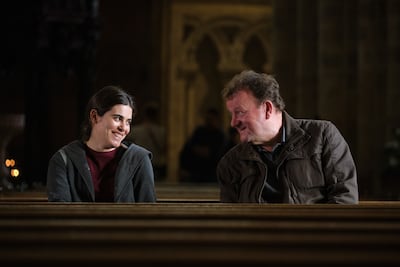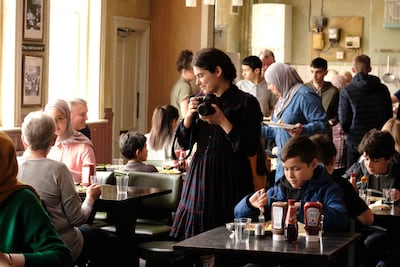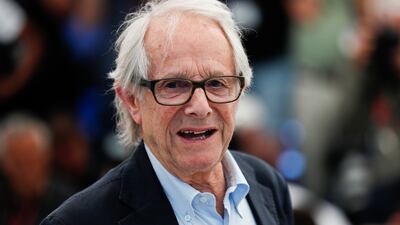When Britain’s Ken Loach released Jimmy’s Hall in 2014, there was talk that this celebrated left-wing filmmaker may be on the verge of retirement after fifty years in the industry. Thankfully, it was an unfounded rumour. Since then, Loach won his second Palme d’Or in Cannes with I, Daniel Blake (2016), set around the food bank crisis in the UK, and followed it with Sorry We Missed You (2019), a stark look at zero hours contracts and the pressures so many workers are under.
Premiering in Cannes last week, The Old Oak completes this loose trilogy, once again set in England’s north-east. Scripted by Paul Laverty, Loach’s regular scribe since 1996’s Carla’s Song, the director felt it was a case of unfinished business.
“Our thread through all the things Paul and I have done has been work and how work has changed,” says Loach, who, at 86, hasn’t lost an ounce of his anger. “From security to insecurity, loss of trade union power, and how inevitable that has been through the demands of capitalism – to use the old word. They demand ever more exploitation of labour.”
Set around a crumbling pub in a former mining community, The Old Oak pinpoints the way successive British governments have ignored poorer areas of the country. In the midst of this, Syrian refugees are being shipped in, stirring mixed feelings among the residents.

Some, like the pub’s landlord TJ Ballantyne (Dave Turner) are sympathetic; others, like the regulars in the pub, mutter racist comments about sending them back to Syria. “Paul had read the first story of the Syrians arriving in the north-east … and then we talked about what ideas we would explore through the collision of the two communities,” says Loach.
Loach is deeply sympathetic for those living in these hugely deprived areas. “It’s a constant in our politics, isn’t it? The economic system produces poverty, produces hardship, produces insecurity, people feel cheated, people feel angry.
“Those who control the media – the politicians, big business – control consciousness, understanding. Through the media, they say the problems are caused by the people below you – the people who are coming in [from overseas]. They’re in your schools. They’re taking your place in the doctor’s queue. In some areas, they’re talking your homes or taking your jobs, and often they will work for less money.”
Certainly these ideas are vented by the film’s less enlightened characters. The turning point comes when TJ meets Yara (Ebla Mari), one of the Syrian refugees whose father has gone missing back home. She’s exactly the spark he needs. “When the Syrians come, TJ has given up, really,” says Loach.
“He says the pub is falling down, there’s nothing in the village, he’s not engaged in those community activities any more.” Gradually, he finds his way back after meeting Yara’s family. One of the film’s most touching scenes comes as TJ and others decide to feed families in the area, both locals and Syrians.
Renovating the back-room of the pub, TJ uses it as a makeshift canteen – the camera glides across black-and-white pictures of miners hanging on the walls. We’re reminded of the word “marra”, a term from the coal mining community meaning “friend” or equal”.
“There is the old miners’ tradition of solidarity,” explains Loach. “When you’re in trouble, we all eat together. It’s very much we support each other and there’s a strength in that. That’s the hope in the film. We have that within us. You’re in trouble, I’ll give you a hand. I’m in trouble, you’ll pull me up. That’s waiting to be expressed.”
It is, of course, exactly what you’d expect from Loach, a director who previously examined the plight of construction workers (1991’s Riff-Raff), cleaners (2000's Bread and Roses) and railwaymen (2001’s The Navigators).
While Loach’s work can be bleak – think of the Scottish coming-of-age drama Sweet Sixteen (2002), for example – The Old Oak is a film that trades in hope. It might just be the most optimistic film he’s made. “Hope became the central issue of the film,” he says. “If you have no hope, racism thrives. If racism thrives, the far right thrives. If the far right thrives, that’s fascism, Nazi-ism, and we know where it ends.”
Loach traces a through-line from the antipathy towards modern-day refugees back to anti-Semitism of the past. “In the Middle Ages we blamed the Jews. Across Europe, the Jews were constantly expelled. It’s finding scapegoats. It’s absolutely to do with money. People will not ask the real question, ‘Why are we poor?’ They will say, ‘Blame the people below you.’
The British director quotes Catholic archbishop Helder Camara who wrote in the '30s: "'When I give food to the poor, they call me a saint. When I ask why the poor have no food, they call me a Communist.' And that’s it exactly,” he says.

While he previously looked at illegal immigrants in Britain (in 2007’s It’s A Free World), this is the first time he and Laverty have engaged with the refugee crisis head-on.
“The Syrians had been through such horrors, horrors, horrors,” he says. “All the men had been tortured. We sat and listened to them one day and it’s just unbelievable. One woman had the most appalling story – lost her children, lost her husband, lost everything. It was a devastating story. We recorded it in the film, but we realised that if we heard that story, in a way you couldn’t watch the rest of the film, because it was so overwhelming. They were extraordinary people.”
With Loach now on the verge of retirement, does he see younger filmmakers following in his footsteps and fighting the good fight? “I couldn’t name names,” he says, shyly.
“Everyone comes from their own generation. I mean, my ideas were formed in the 1960s when I began work. There was a new left movement, which was anti-Stalinist, anti-Washington. And people now grow up in a different time, with different references.
“But you meet young filmmakers and they’re desperate to do films about what is happening. They’ll find their own way.”

